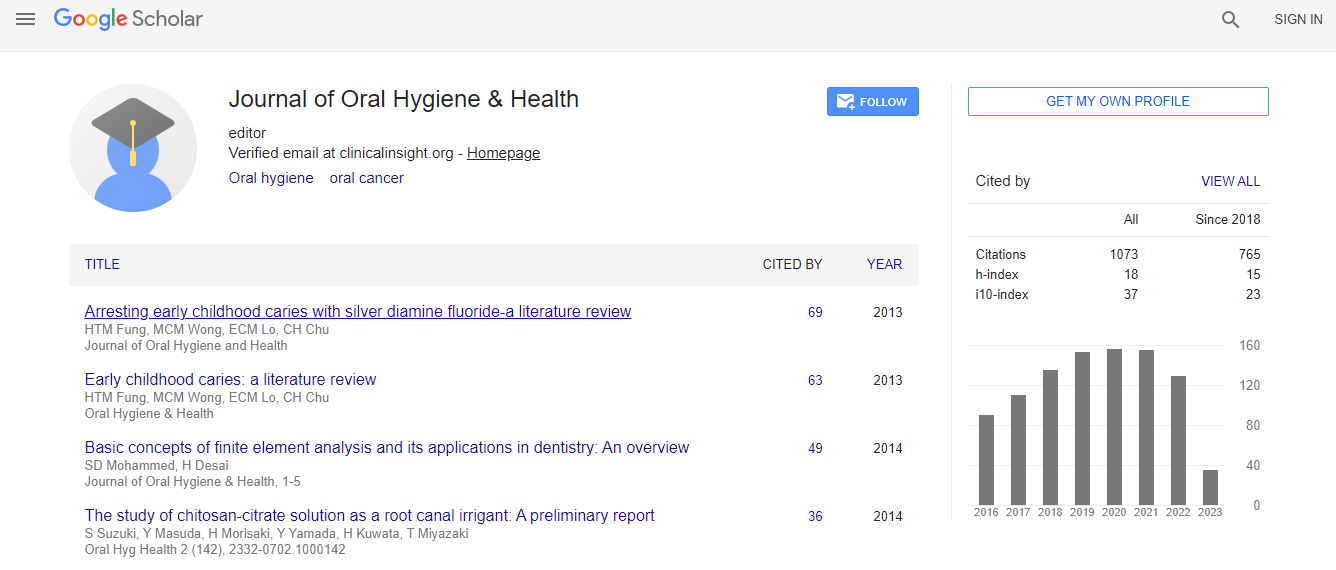Our Group organises 3000+ Global Conferenceseries Events every year across USA, Europe & Asia with support from 1000 more scientific Societies and Publishes 700+ Open Access Journals which contains over 50000 eminent personalities, reputed scientists as editorial board members.
Open Access Journals gaining more Readers and Citations
700 Journals and 15,000,000 Readers Each Journal is getting 25,000+ Readers
Recommended Conferences
Google Scholar citation report
Citations : 1073
Journal of Oral Hygiene & Health received 1073 citations as per Google Scholar report
Journal of Oral Hygiene & Health peer review process verified at publons
Indexed In
- Index Copernicus
- Google Scholar
- Open J Gate
- JournalTOCs
- RefSeek
- Hamdard University
- EBSCO A-Z
- OCLC- WorldCat
- Publons
- Geneva Foundation for Medical Education and Research
- Euro Pub
- ICMJE
Useful Links
Recommended Journals
Related Subjects
Share This Page
Cigarette smoke regulates the expression of human �² defensins via NOD1/RIP2 signal pathway in human oral mucosa
2nd International Conference on Restorative Dentistry and Prosthodontics
Wang Wenmei
Nanjing University, China
Posters & Accepted Abstracts: J Oral Hyg Health
Abstract
Smoking is a well recognized risk for periodontitis, oral candidiasis, oral leukoplakia and oral cancer. Cigarette smoke has been confirmed to dampen innate immune in some human tissues, such as oral mucosa. The epithelium of oral mucosa acts as a defense shield against microorganisms and other harmful stimulating factors such as smoking. Nucleotide binding oligomerization domain 1 (NOD1) signal pathway and human �² defensins (hBDs) play crucial roles in innate immune. So far there is very little study about the effect of smoking on local innate immune response of oral mucosa. Therefore, the aim of this study was to evaluate potential effects of smoking on NOD1 signaling expression in oral mucosa. Tissue specimens of normal oral mucosa were collected from donors undergoing routine surgical treatment. All 20 participants were classified equally as two groups: Non-smokers and smokers. By using Western blotting and immunohistochemistry, we investigated differential expression of NOD1 and RIP2, using immunohistochemistry to detect hBD-1, -2, and -3 in oral mucosa tissues between non-smokers and smokers. Immortalized human oral mucosal epithelial (Leuk-1) cells were treated with various concentrations of cigarette smoke extract (CSE) for 24 h. Western blotting and immunofluorescence assays were performed to study CSE-induced alteration of NOD1 and RIP2 protein expression. The change of hBDs expression were tested using immunofluorescence, qPCR, and ELISA. Leuk-1 cells were treated with 4% CSE, iEDAP (NOD1 agonist), CSE + iE-DAP. And then Real-time PCR and ELISA were performed to detect the mRNA levels and secretion of hBD-1, -2, and -3, respectively. The results showed that the levels of NOD1, hBD-1 and hBD-3 were significantly reduced in oral mucosa tissues of smokers compared with non-smokers. The levels of RIP2 and hBD-2 were remarkably enhanced in oral mucosa tissues of smokers. CSE treatment suppressed NOD1 expression and activated RIP2 expression in Leuk-1 cells. The mRNA and secretory levels of hBD-1 and -3 were down-regulated by CSE, while the mRNA and secretory level of hBD-2 were up-regulated by CSE. The iE-DAP treatment reversed the regulatory effects of CSE. The present study indicated that cigarette smoke could potentially modulate the expression of crucial molecules of NOD1 signal pathway and hBDs in human oral mucosal epithelium. NOD1 signal pathway played an important role in the regulatory effects of CSE on hBDs levels in oral mucosal epithelial cells.Biography
Wang Wenmei is a Professor, and Deputy-Dean of Nanjing Stomatological Hospital, Medical School of Nanjing University, a well-known specialized subject hospital in China. In recent years, she has participated in more than 9 research projects, presided over 2 National Natural Scientific Funding of China. She has published more than 100 papers, of which 16 were included by SCI. She has been serving as an Editorial Board Member of the Clinics in Oncology, Journal of Dentistry and Oral Biology, SM Journal of Public Health & Epidemiology, International Journal of Oral and Craniofacial Science, SM Dentistry Journal, etc. And she has been serving as a Reviewer of the Neurotoxicity Research, Journal of Cellular Physiology, and Cancer Research Frontiers. She has won a number of honors and awards, including “Scientific and Technological Progress Award” of Jiangsu Province, “Medical Scientific and Technological Award of Jiangsu Province”, “Scientific and Technological Progress Award” of Nanjing City, “New Technological introduction Award” from the Health Department of Jiangsu Province, etc.
Email: wangwenmei0102@163.com

 Spanish
Spanish  Chinese
Chinese  Russian
Russian  German
German  French
French  Japanese
Japanese  Portuguese
Portuguese  Hindi
Hindi 
